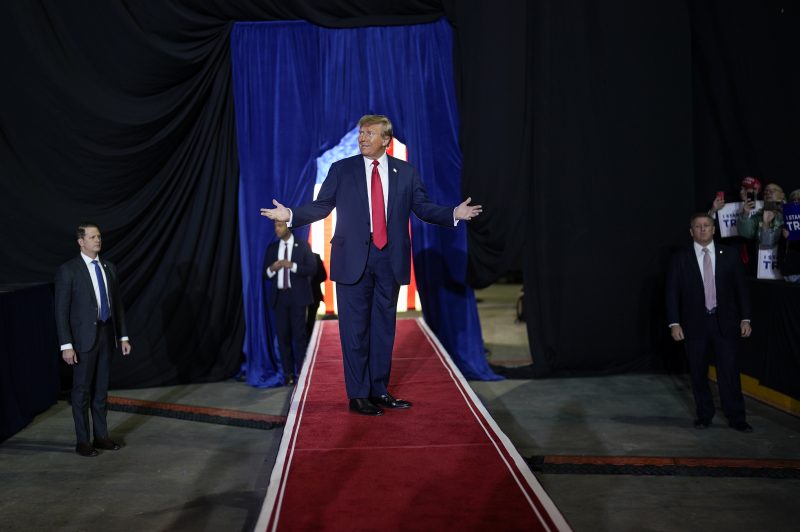In a little more than 24 hours, New Hampshire Republican primary voters could effectively bring the 2024 nominating contest to a close.
Nikki Haley now has Donald Trump in the one-on-one race she had hoped for, but she trails in every poll in the state. If she can’t win head-to-head in New Hampshire, with its friendly electorate — and if Trump wins a majority of the vote there like he did in Iowa — it will be abundantly clear where this is headed: a third straight presidential nomination for Trump. Republicans will have chosen, and they will have chosen very quickly.
At this point of potential no return for the GOP, it’s worth reflecting on what that would amount to: a huge gamble.
The former president currently polls competitively with President Biden in a hypothetical 2024 matchup. But that doesn’t mean Republicans wouldn’t be saddling up for a rocky ride.
For a few reasons.
Despite Trump polling relatively well right now, his electoral track record is unmistakably poor:
He lost the popular vote in both the 2016 and 2020 presidential elections.His party lost the popular vote in the 2018 midterm elections by the largest margin since the 1980s.When Republicans lost the Senate after the 2020 election, Trump became the first president since Herbert Hoover to lose both chambers of Congress and the presidency in a single term. (Trump recently attacked Haley by saying she would lose all three, ignoring the fact that he himself already had.)The 2022 midterms, in which Trump sought to exert control over his party’s course, was arguably the worst in a century for a party that didn’t control the White House. Trump-backed candidates also routinely underperformed other Republicans.
None of that means Trump can’t win in 2024. He could. He was closer to winning the electoral college in 2020 than a lot of people realize. His voters seem to turn out better when he’s on the ballot.
But Republicans would be placing a lot of faith in a guy whose political instincts haven’t exactly rewarded that.
The reason Trump has as much of a chance as he does right now boils down to a couple of things: how unpopular Biden is, and the prospect of third-party candidates hurting Biden.
Biden’s continued unpopularity is not assured, and the third-party factor is likely to matter less as the race goes on.
Trump is a well-defined, known quantity to American voters. He didn’t crest 47 percent in either of his two campaigns, and both his approval and favorable ratings have pretty consistently hovered around 40 percent. (Trump actually took a higher share of the vote in 2020 than in 2016, but he won in 2016 because of an unpopular opponent and third-party candidates taking significant vote shares.)
That suggests Trump has a ceiling in the mid- to high 40s, and Biden’s numbers would have to remain down.
Which is possible. But signs right now are that the economy is headed in a better direction, which could help Biden. And while third-party candidates are taking historically large numbers in the polls, history shows that most of their would-be voters ultimately come home to one of the two major-party candidates.
Republicans can also see with their own eyes how much better a more standard-issue Republican could do. Haley generally polls better than Trump does in general-election matchups with Biden.
Also consider: Trump’s favorable rating is currently better than it has been at any point since he left office and higher than it was for most of his presidency (averaging 43 percent). One way to look at it is that he’s becoming more popular; another way is that he could be at an unsustainable high point.
The legal and political calendars are shaping up so Republicans could be designating Trump with virtually no clue about how his legal issues will shake out. And that means one of the biggest X-factors in modern presidential politics will loom.
There is little question that Trump’s indictments helped him in the primaries — and that the vast majority of Trump voters would stick with him even if convicted. But the legal issues could still hurt him significantly in the general election.
Of particular note: Polls have shown that a criminal conviction would reduce Trump’s general-election margins by between 5 and 14 points. Even if the swings aren’t that big, this could be decisive, given how close our elections typically are.
It’s also important to note that, while political watchers might be familiar with the details of Trump’s indictments, many voters are not.
Large quantities and even majorities of Trump backers say they believe Trump didn’t take classified documents to Mar-a-Lago (he did) and that he didn’t try to overturn the 2020 election (he did, allegedly illegally). About 6 in 10 independent voters said they had heard only “a little” or “nothing at all” about Trump’s indictments, October polling showed.
That’s a lot of voters who don’t seem to have internalized Trump’s conduct but could by the time November comes.
Trump has never made it easy to stand in his corner. However you feel about him, there’s no question that he creates unnecessary problems for himself (see: taking the classified documents), which he often needlessly provokes, and that his off-the-cuff style can go very wrong.
Lately, Trump has made clear how unwieldy he could be over the next nine-plus months:
He mixed up Haley and former House speaker Nancy Pelosi, echoing his repeated mixing up of Biden, Barack Obama and Hillary Clinton. (Yes, Biden has plenty of senior moments, but Trump doing this kind of thing could diminish one of his biggest advantages against Biden — perceived mental sharpness.)Trump has taken to casting Haley, whose parents immigrated from India, as less American. After repeatedly alluding to her given first name, Nimarata, he explained it to Fox News this weekend by citing “wherever she may come from.” (An example of how something like this might play: When Trump in 2016 suggested a judge of Mexican heritage was inherently biased against him, two-thirds of Americans labeled it a racist comment. About 6 in 10 Americans also said they were bothered by Trump’s “birther” campaign against Obama.)He has repeatedly flirted with a more authoritarian vision for a second term, arguing for full presidential immunity even for “events that ‘cross the line.’” That’s something that many of his backers support but that Americans writ large appear pretty uncomfortable with. (Americans oppose Trump’s claim to full presidential immunity 2-1, and an even larger margin says presidents should always follow the law.)
All of this is from the past week alone, and there’s a compelling case to be made that Americans aren’t terribly familiar with it.
As the Atlantic’s McKay Coppins wrote recently: “These days, Trump exists in many Americans’ minds as a hazy silhouette — formed by preconceived notions and outdated impressions — rather than as an actual person who’s telling the country every day who he is and what he plans to do with a second term.”
That is a luxury of a man who hasn’t had to run a full-fledged campaign for a second term yet. It is not a luxury he is likely to benefit from come November.

